Is Hunt’s dream possible?
- 28 January 2013

Health secretary Jeremy Hunt has just announced he wants the NHS to become the “most digital health service in the world.”
Specifically, he told the Policy Exchange think-tank that he wants all records and communications in the NHS to be electronic by 2018.
This target can be added to what is now a long list of ambitions for digitising the health service.
This includes all hospitals operating electronic records by 2014; all patients to have access to their GP record online by 2015; and all NHS referrals to be paperless by 2015.
Hunt believes he can convince NHS managers that investing in technology will help their organisations to deliver the efficiency savings that are being demanded of them, as the health service tries to balance flat funding with rising demand.
There is no central funding for the plans, but a report commissioned from consultants PriceWaterHouseCoopers has estimated that more ambitious use of IT would save the NHS £4 billion.
Kings on track to become paperless
King’s College Hospital NHS Foundation Trust was singled out by the health secretary as being “on track” to become paperless by the end of the year.
Colin Sweeney, director of ICT at King’s, believes Hunt’s ambition is an admirable one, but says the road to a paper-free NHS is not straight-forward or without a few wrinkles.
“Our aim to be paperless, or as paper-free as possible, by the end of 2013 is obviously quite a struggle to achieve, and we’ve been working on it for quite some time,” he says.
“When you think about other organisations that haven’t progressed that far you think: ‘how are they going to achieve that?’ Especially with the financial restrictions and cost improvement programmes in place.”
Paper still quick and easy
The “people factor” is another issue, Sweeney explains, as often it is quicker to write something down than to find a computer terminal, log in and type it up.
Paper is used for numerous tasks in the hospital and not all can be easily digitised. King’s has had particular challenges with making signatures and diagrams electronic.
Sweeney says it is important to get clinicians on board by highlighting the importance of having notes available in multiple places at the same time, a feat which cannot be achieved with paper.
He adds that any electronic system used also has to be reliable, or people lose faith in it.
Making the dream a reality
Christine Walters, Pennine Acute Hospitals NHS Trust’s associate director of IM&T and a nominee for the ‘healthcare IT champion of the year’ in 2012, believes the NHS will never be paperless, but can be paper-lite.
She added that in some situations, paper remains the easiest tool to use. “I think a lot of trusts in the NHS are on their way to becoming paper-lite,” she explains.
Pennine Acute rolled out iSoft’s electronic prescribing system in late 2011.
“I can only speak for our organisation, but we recognise the need for using technology, not only to deliver the best possible patient care and efficiency, but also financially,” says Walters.
“We are out to procurement for a scanning solution at the moment and we see that as a wise investment.”
Dr Paul Altmann is chief clinical information officer at Oxford University Hospitals NHS Trust, which deployed Cerner Millennium in November 2011.
He describes Hunt’s target as exceptionally ambitious, “given that there are millions of paper records held by multiple organisations in the NHS.
"These may or may not be in the process of considering how to procure electronic patient record systems, let alone get them fully deployed and adopted.
“In addition, the legacy paper needs to be scanned and be available with (preferably within) the digital records.”
Dr Altmann explains that while storing information electronically is important, sharing digital information between all organisations involved in the care of a patient is a vital component in achieving the benefits of Hunt’s ambition.
“There is no doubt that this is the right approach. Having all of the necessary clinical information available about our patients, whenever and wherever it is needed, leads to safer and more evidence-based clinical decision making and allows patients to be looked after far more safely and efficiently.
“Oxford has a digital vision and we continue to take this matter very seriously, as we recognise that it is one of the key enablers as we strive to deliver compassionate excellence in the care we deliver."
Clinicians are key
Fellow chief clinical information officer and London GP Dr Phil Kozcan says there is a lot of good work going on within individual organisations to develop e-records. Like Dr Altmann, he believes the challenge is getting interoperability.
“If the focus is on interoperability that’s achievable, but it’s just a question of driving that focus,” he says.
Dr Kozcan, who is CCIO at UCL Partners, argues that there needs to be a bottom-up approach of trusts working with suppliers, but also a clear direction of travel from Government including setting standards and protocols.
“It’s bringing these needs together and that’s a challenge, particularly in a world where there’s not a great deal of money around,” he says.
“In order for the NHS to be more efficient it needs to make better use of IT to support the change and historically we have done IT for the sake of IT, we haven’t done IT to support the business change required.”
“CCIOs need to bring together the clinicians, the technology and the management and look at how to work with their clinicians in local organisations to make it happen.”




